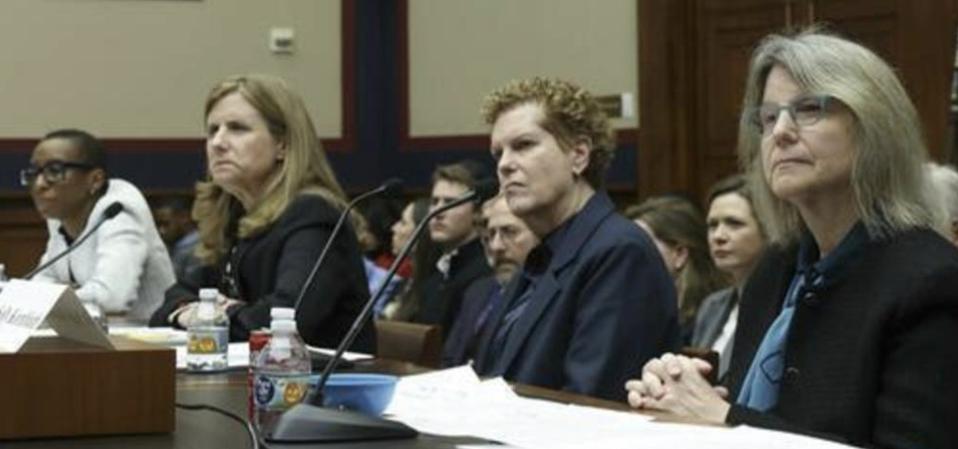“What were they thinking? Who were they listening to?” we asked ourselves as we watched the three university Presidents face a searing Congressional inquisition on anti-Semitism at their institutions, which not only harmed their credibility and that of their universities, but caused two of them to leave their positions.
While the Presidents of MIT, University of Pennsylvania, and Harvard gave strong, elegant and convincing opening statements — all of which seemed strikingly similar — their advantage was dissipated during the questioning, which was notable for its toughness, but also for pushing the Presidents into a trap that was almost impossible to escape.
The ultimate no-win situation
‘Yes or no’ they were told to answer by Representative Elise Stefanik, did the cries of “Intifada” on their campuses — taken to mean death to Israel and Jews — constitute bullying and harassment, and thus were against the rules of their universities?
The Presidents were basically asked to choose between free speech and the banishment of hate speech that calls for violence. The questions demanded strong, emotionally intelligent but institutionally decisive answers to blunt questions — that absolutely everyone knew were coming. The need was for real answers, not verbal gamesmanship. Yet, the Presidents just were not prepared to answer the questions decisively and resonantly, and they kept reverting back to the idea that there was no one answer — such bullying had to be taken “in context.”
But “it depends,” is hardly an emotionally satisfying response for those seeking moral clarity and simplicity. ‘It depends’ not only doesn’t work, it infuriates. And the Presidents’ advisors should have told them that, in the preparation. Instead, it appears that the advisors actually counseled such answers…
My advice: when in doubt, when in an intractable situation, go human first, and then deal with the consequences later.
Whose advice did the Presidents take, and why?
So, whose advice did the Presidents take? Who did they choose to listen to and trust in the breach? And why? Was it because the advice confirmed everything they believed themselves; because they were forced to use the same advisors that their biggest donors trust and use; or because their fields of vision were just too narrowly focused on the academy, and not the rest of society over which they still have great influence?
As a leader, you are only as good as the worst advice you take. And the art of figuring out how to judge judgement can make all the difference to the performance of a Corporate CEO, College President, or political contender.
Later it was revealed that the same law firm had advised both Harvard and the University of Pennsylvania, and had met at least once with MIT. Moreover since two of the Presidents are legal scholars, in all probability they all “spoke the same language.” But that’s not necessarily the same language as Congress, or the American people relate to.
In the most evolved corporate boards, they appoint a different director as “critic” for each meeting. That director’s job is to challenge every decision made; to stress test it, so that group think doesn’t take over. It seems to me that this is an important role for every crisis advisor to play, as well.
The Tone-Deaf Club
But, the Presidents’ performance is not an outlier. With their tone-deaf responses to the Committee’s challenges, these Presidents joined a Club made up of corporate, educational and governmental leaders that you would never want to be a part of, including:
Michael Dukakis, who, when asked in a Presidential Debate if he would still be against the death penalty if his dear wife had just been raped and murdered, gave the most dryly academic and unemotional response as to why he would still be against it. Many say it cost him the election.
Also in the club, is the former CEO of BP, Tony Hayward, who when asked about the Deepwater Horizon oil-spill disaster in the US Gulf, where 11 men died, said, “There’s no one who wants this over more than I do. I want my life back…”
Almost no one in the Tone-Deaf Club survives their missteps.
Listening to the Wrong Advisors
What each Club member forgot, as the heat was turned up, was that they are moral leaders and role models first, and organizational leaders second. That needed to be understood and lived up to, even if they had to give up their legally exact definitions — for the moment. The primacy of their moral centers will, in the end, make them even better leaders — possibly world-class.
But if they did forget, their advisors should have reminded them. Instead, these leaders each made a cardinal mistake of leadership — they did not know who to listen to, they doubled down on their own preferences, they picked the wrong advisors, and they took the wrong advise to heart.
There is an art and skill to choosing the right advisors that can be learned, to leaders’ advantage.
Tomorrow, I’ll post the ‘11 attributes’ leaders can and must consider in order to judge judgment and choose the right counsel, from the most trustworthy of advisors.

